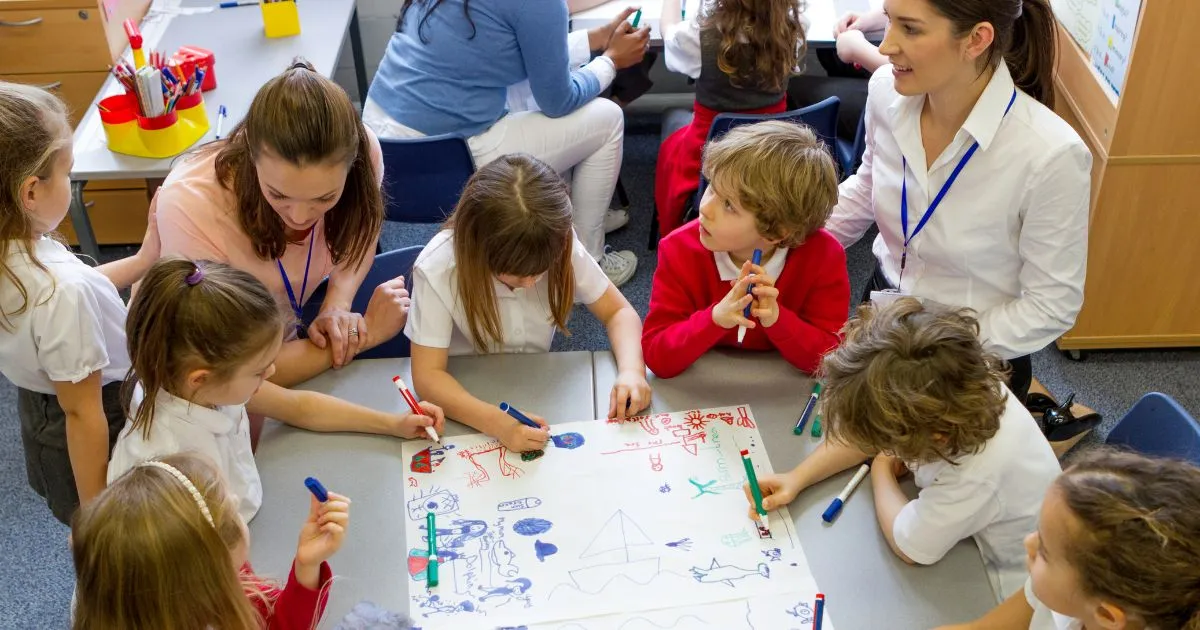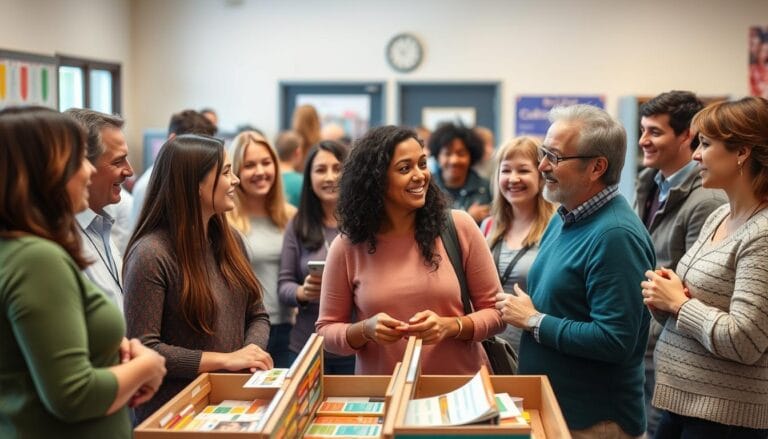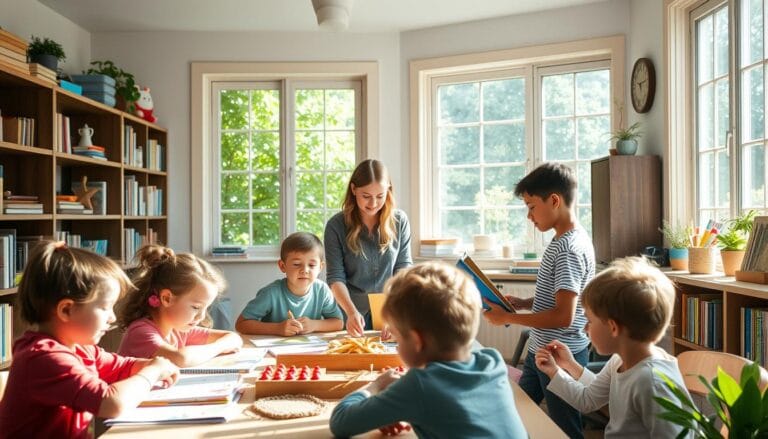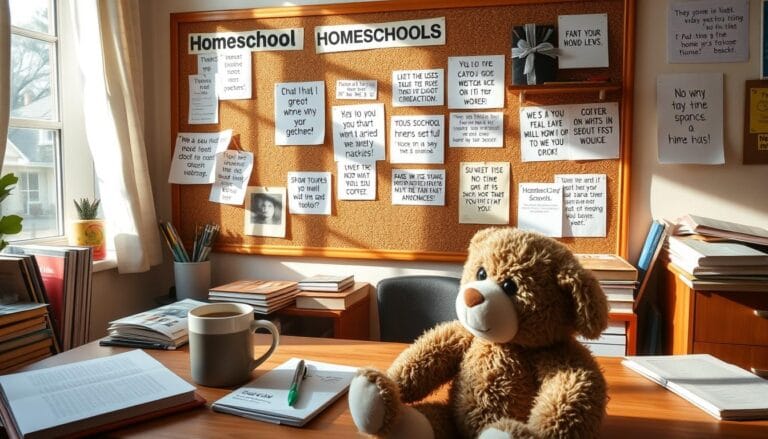School Readiness Activities to Boost Confidence in Kids
Getting your child ready for school opens up a world of possibilities. Every parent dreams of their child entering the classroom with confidence and excitement. School readiness activities help turn nervousness into eagerness.
Studies show kids who do early learning activities feel 20% more confident. These activities do more than just prepare for school. They lay the groundwork for a lifetime of learning and growth.
Experts say early preparation is key, not just for school skills. It helps kids develop social, emotional, and thinking skills. These skills are crucial for their educational journey.
Activities like role-playing and simple math games are part of school readiness. They help kids adjust to school life smoothly. This makes the transition from home to school easier.
In the next parts, we’ll look at fun ways to get your child ready for school. We’ll show how to make learning an exciting adventure for them.
Table of Contents
Understanding the Importance of Early School Preparation
Kindergarten preparation is more than just a buzzword in preschool education. It’s a key foundation for your child’s academic journey. Research shows that about 90% of a child’s brain development happens before age five. This makes early learning crucial for future success.
Your child’s early educational experiences shape their growth. Children who learn through structured activities show great advantages in school and life.
The Role of Foundational Skills in Academic Success
Foundational skills are the basics of lifelong learning. These include:
- Basic literacy and numeracy
- Social interaction capabilities
- Emotional regulation
- Problem-solving techniques
“Early learning experiences set the stage for future academic achievement.” – Educational Research Institute
How Early Preparation Impacts Child Development
Preschool education is key in child development. Studies show that kids in quality early learning programs are 50% more likely to be curious and persistent.
Benefits of Structured Learning Activities
Structured learning activities offer many benefits for young learners, including:
- Enhanced cognitive skills
- Improved social interactions
- Better emotional intelligence
- Increased school readiness
Investing in your child’s early education is an investment in their future success.
Building Essential Social Skills for School Success
Getting your child ready for school is more than just learning numbers and letters. Social skills are key for kids to do well in class. Studies say 30% of kindergarten teachers face big challenges with kids’ social skills and teamwork.
Teaching your child to be social is a big part of growing up. These skills help kids:
- Talk well with friends and teachers
- Know and handle their feelings
- Work together in groups
- Make good friends
“Learning is fundamentally a social process that influences children’s engagement and academic success.” – Educational Research Findings
Parents can help kids learn social skills in fun ways:
- Organized Playdates: Set up times for kids to play together
- Role-playing to practice talking and listening
- Board games that teach sharing and working together
- Showing good social behavior at home
Spending time on social skills helps your child succeed in school and life. Studies show that being social in early years helps kids do better in school, even more than just being smart.
Developing Fine Motor Skills Through Creative Activities
Preschool education is key in building fine motor skills. These skills are vital for writing, drawing, and everyday tasks. They involve precise movements of small muscles in the hands and fingers.
Children spend a lot of their school day doing fine motor activities. This shows how important it is to build these skills early on.
Art and Drawing Exercises
Creative art is a great way to improve fine motor skills. Try these fun activities:
- Coloring with different-sized crayons and pencils
- Drawing shapes and patterns
- Creating detailed artwork with small markers
Hands-on Crafts and Manipulation Tasks
Hands-on activities boost hand-eye coordination and muscle strength. Here are some fun crafts:
- Cutting paper with child-safe scissors
- Stringing beads
- Manipulating play dough
- Completing simple puzzles
“Small hands can create big achievements through purposeful practice.”
Writing and Tracing Practice
Getting ready for handwriting needs regular practice. Engage your child with these activities:
- Tracing letters and numbers
- Practicing grip with various writing tools
- Exploring different writing surfaces
By adding these creative activities to your child’s routine, you help them develop important fine motor skills. These skills are crucial for future academic success.
School Readiness Through Cognitive Development
Cognitive abilities are key to getting your child ready for school. Early learning shapes their thinking, problem-solving, and reasoning. From ages 2-6, kids’ brains grow fast, laying the groundwork for school success.
Knowing about cognitive development helps parents support their kids’ learning. Studies show kids who do fun activities can get better by up to 30% in thinking skills. These skills include:
- Memory enhancement
- Critical thinking
- Attention span improvement
- Problem-solving capabilities
“Play is the highest form of research.” – Albert Einstein
Engaging activities can boost your child’s thinking skills. Simple games and experiences can greatly help their learning. Here are some ideas:
- Introduce age-appropriate puzzles
- Play memory matching games
- Conduct simple science experiments
- Encourage imaginative play
By focusing on cognitive development, you’re helping your child get ready for school. Remember, every interaction is an opportunity for learning and growth.
Fostering Emotional Intelligence and Self-Regulation
Emotional intelligence is key in child development, as kids get ready for school. The first five years are crucial for developing social-emotional skills. About 90% of emotional intelligence forms during this time.
Understanding and managing emotions helps kids deal with social situations better. Studies show that kids with strong emotional intelligence:
- Have better communication skills
- Can solve conflicts better
- Are more resilient
- Have better relationships with peers
Managing Separation Anxiety
Starting school can make young children feel anxious about being apart. You can help your child by:
- Creating a consistent goodbye routine
- Practicing short separations
- Listening to their feelings
- Believing in their abilities
Building Resilience and Coping Skills
Teaching kids to handle challenges is part of building emotional resilience. Perspective-taking activities like storytelling and role-playing boost empathy and understanding.
Emotional intelligence helps kids manage their feelings well.
Developing Self-Control Techniques
Simple methods can help kids control their emotions, such as:
- Deep breathing exercises
- Counting to calm down
- Positive self-talk
- Knowing what triggers their emotions
Supporting your child’s social-emotional skills sets them up for success in school and life.
Creating Effective Daily Routines and Structure
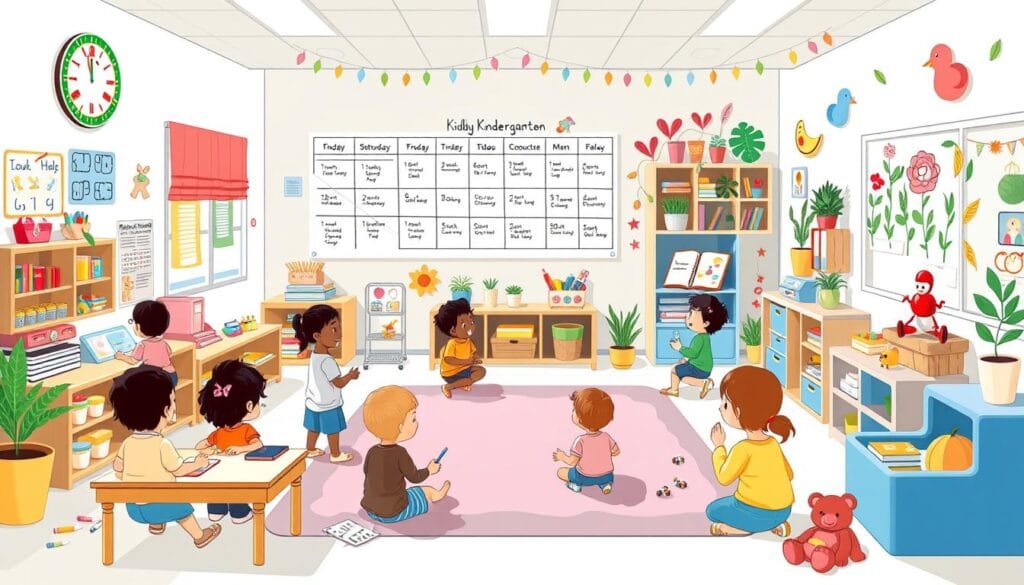
Creating daily routines is key for getting ready for kindergarten. These routines give kids a sense of safety and what to expect. This is vital for their success in preschool.
When kids know what’s coming, they do better. Studies show that 70% of kids improve their self-control with routines. A steady routine helps them feel less anxious and more confident.
“Routines are the foundation of a child’s sense of stability and learning readiness.” – Child Development Expert
Key Elements of Effective Daily Routines
- Use visual schedules to help children understand daily activities
- Maintain consistent wake-up and bedtime schedules
- Incorporate learning activities into daily tasks
- Allow children to participate in household responsibilities
- Practice smooth transitions between activities
When making routines for preschool, aim for fun and flexible schedules. Letting kids help plan routines can make them more eager to follow by 25%. Visual aids and timers help kids keep track, boosting their independence.
Tip: Start implementing routines gradually and be patient with your child’s adaptation process.
By setting up daily routines that are structured yet adaptable, you help your child grow emotionally. This prepares them well for the structured world of kindergarten.
Enhancing Language and Communication Skills
Language development is key in early learning and getting ready for school. Kids who can communicate well can talk to others, understand what teachers say, and share their thoughts confidently.
Building strong communication skills is fun and interactive. Studies show that kids who are around lots of language can learn up to 30% more words in their early years.
Story Time and Reading Activities
Reading aloud makes learning languages exciting. Here are some ways to boost your child’s communication skills:
- Choose books that are right for their age with colorful pictures
- Use fun reading methods that get them involved
- Ask questions about the characters and stories
- Make reading a regular part of their day
“Play is essential for developing the whole child across cognitive, communicative, social, physical, and emotional domains.” – American Academy of Pediatrics
Conversation and Expression Practice
Help your child talk more by starting conversations. Simple questions like “Tell me about the best part of your day” can really help them speak more.
Vocabulary Building Games
- Word association games
- Storytelling with picture cards
- Role-playing scenarios
- Dramatic play activities
Using these methods will help your child grow their language skills. This will get them ready for a great start in early learning.
Physical Activities to Boost School Confidence
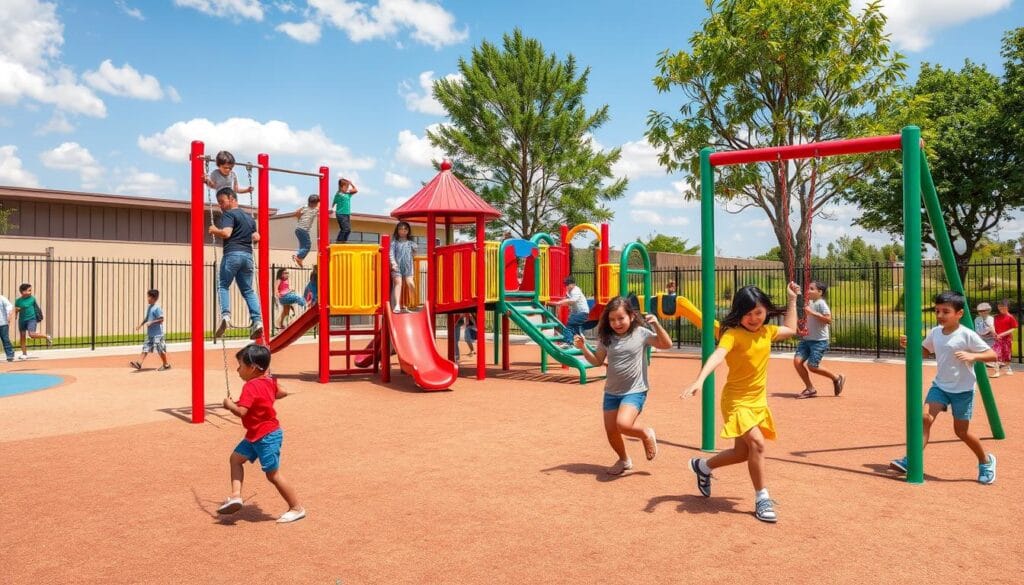
Physical activities are key in child development and getting ready for kindergarten. They help your child feel more confident and ready for school. Studies show kids who move a lot can feel up to 30% more confident.
Here are some activities that can boost your child’s confidence:
- Obstacle courses that challenge balance and coordination
- Dancing games to improve rhythm and body awareness
- Playground activities that develop gross motor skills
- Team sports promoting social interaction
“Movement is a child’s first language of learning and self-expression.”
Active play is great for getting ready for kindergarten. It helps kids:
- Develop spatial awareness
- Improve muscle strength
- Enhance concentration
- Build emotional resilience
By making physical activities a regular part of your child’s life, you’re doing more than just getting them ready for school. You’re helping them build confidence and skills that will last a lifetime.
Parent-Child Bonding Activities for School Preparation
Getting your child ready for school is more than just learning numbers and letters. It’s about family bonding and building confidence. A strong bond between parents and children helps a lot in getting ready for school.
Doing fun activities together makes learning exciting for both parents and kids. Studies say just 10 minutes of quality time can meet a child’s need for attention. It also helps them grow and develop.
Interactive Learning Games
Turn everyday moments into learning fun with these activities:
- Puzzle solving to enhance problem-solving skills
- Cooking together to teach measurement and following instructions
- Nature exploration games to boost observational skills
- Pretend play to develop creativity and social interactions
Family Engagement Strategies
Good family engagement makes learning fun and meaningful. Try these strategies:
- Create a consistent daily routine
- Involve children in household tasks
- Discuss daily experiences together
- Read together for at least 20 minutes daily
Supporting Independence
Help your child become more independent by:
- Allowing them to make simple choices
- Teaching self-care skills
- Praising effort over perfection
- Creating opportunities for problem-solving
“Children learn best when they feel loved, supported, and encouraged to explore.”
Early learning is about building confidence, curiosity, and a love for discovery. Your help is key in getting your child ready for school success.
Monitoring Progress and Celebrating Achievements
Tracking your child’s school readiness is key to seeing their growth and boosting their confidence. Child development is a moving process that needs careful watching and celebrating milestones.
Here are some ways to keep track of your child’s progress:
- Create a simple progress tracker with visual elements
- Use performance portfolios to document skill development
- Implement periodic self-assessment activities
Studies show that students who track their own progress can see a 14 percentage point boost in scores. Using sticker mosaics and progress charts makes tracking fun and engaging.
“Recognition of student achievements is directly linked to improved performance and higher school retention rates.” – Education Research Team
Think about using grading methods that give clear insights:
- Outstanding (O)
- Satisfactory (S)
- Needs Improvement (N)
Regular meetings with teachers can give you a clear view of your child’s growth. These talks offer insights into their school readiness and what they need more help with.
Conclusion
School readiness is not just one step—it’s a journey of growth. It prepares kids for school and life’s challenges. Studies show that 48% of kids face hard times when starting kindergarten. This highlights the need for early learning strategies.
Getting ready for school means understanding many areas of development. Skills like language and emotional intelligence are key. Children from different backgrounds may need extra help, due to things like language and family income.
Parents can make a big difference by supporting their child’s growth. Activities that boost thinking, feeling, and moving skills are crucial. Every child learns in their own way, and loving support is vital.
Being involved in your child’s early learning can turn challenges into chances for growth. With patience and creativity, you can help your child grow confident and ready for school.


